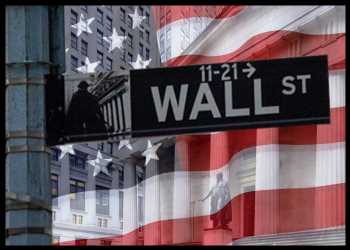Stocks have moved sharply lower over the course of morning trading on Friday, largely offsetting the upward move seen over the two previous sessions. The major averages have all shown notable moves to the downside on the day.
Currently, the major averages are just off their lows of the session. The Dow is down 412.23 points or 1.2 percent at 32,879.55, the Nasdaq is down 235.29 points or 1.9 percent at 12,403.97 and the S&P 500 is down 62.28 points or 1.5 percent at 4,136.84.
The sell-off on Wall Street reflects a negative reaction to Federal Reserve Chair Jerome Powell’s highly anticipated remarks at the Jackson Hole economic symposium.
In his prepared remarks, Powell acknowledged the central bank’s efforts to combat inflation will cause “some pain” but argued a failure to restore price stability would mean “far greater pain.”
Powell reiterated the Fed’s resolve to bring inflation back to its 2 percent target, declaring that the “economy does not work for anyone” without price stability.
The Fed chief said the central bank would use its tools “forcefully” to bring demand and supply into better balance.
Powell noted lower inflation readings in July are welcome but said the Fed will need to see more than a single month’s improvement before it is confident that inflation is moving down.
Ahead of Powell’s remarks, the Commerce Department released its report on personal income and spending in the month of July, which included a reading on inflation said to be preferred by the Fed.
The report showed the annual rate of core consumer price growth slowed to 4.6 percent in July from 4.8 percent in June. Economists had expected the pace of growth to slow to 4.7 percent.
Including food and energy prices, the annual rate of consumer price growth slowed to 6.3 percent in July from 6.8 percent in June. The slowdown surprised economist, who had expected the pace of growth to accelerate to 7.4 percent.
In July, the Fed decided to raise interest rates by 75 basis points for the second meeting in a row, increasing the target range for the federal funds rate to 2.25 to 2.50 percent.
Powell noted he said at the time that another unusually large rate hike could be appropriate at the next meeting set for September 20-21.
“We are now about halfway through the intermeeting period,” Powell said. “Our decision at the September meeting will depend on the totality of the incoming data and the evolving outlook.”
While Powell said it will likely become appropriate to slow the pace of rate hikes “at some point,” traders may have been hoping for a more definitive declaration.
Computer hardware stocks have shown a substantial pullback on the day, resulting in a 4.3 percent nosedive by the NYSE Arca Computer Hardware Index.
PC maker Dell Technologies (DELL) has helped lead the sector lower after reporting mixed fiscal second quarter results and warning of slowing sales.
Significant weakness is also visible among semiconductor stocks, as reflected by the 2.9 percent slump by the Philadelphia Semiconductor Index.
Interest rate-sensitive housing stocks are also seeing considerable weakness, dragging the Philadelphia Housing Sector Index down by 2.5 percent.
Gold, retail, oil service and airline stocks have also shown notable moves to the downside amid broad based weakness on Wall Street.
In overseas trading, stock markets across the Asia-Pacific region moved mostly higher during trading on Friday. Japan’s Nikkei 225 Index climbed by 0.6 percent, while Hong Kong’s Hang Seng Index jumped by 1.0 percent.
Meanwhile, the major European markets have shown notable moves to the downside on the day. While the U.K.’s FTSE 100 Index has fallen by 0.7 percent, the French CAC 40 Index is down by 1.6 percent and the German DAX Index is down by 1.9 percent.
In the bond market, treasuries have seen considerable volatility over the course of the morning. The yield on the benchmark ten-year note, which moves opposite of its price, is currently up by 2.8 basis points at 3.054 percent.
Source: Read Full Article
